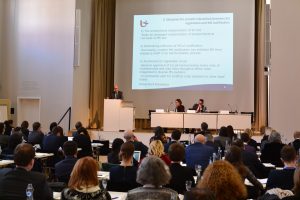Views
Religious Conversion and Custody – Important New Decision by the Malaysian Federal Court
A saga that has kept Malaysians engaged for years has finally founds its conclusion. A woman, named (rather improbably, at least for European observers) Indira Gandhi, was fighting with her ex husband over custody. The ex-husband had converted to Islam and had extended the conversion to their three children, with the consequence that the Syariah courts gave him sole custody. What followed was a whole series of court decisions by civil courts on the one hand and Syariah courts on the other, focusing mainly on the jurisdictional question which set of courts gets to decide matters of religious status and which law—Islamic law or civil law—determines the question. The Malaysian Federal Court now quashed the conversion as regards the children, thereby claiming, at least for children, a priority of the Constitution and the jurisdiction of civil courts.
Although the case is mostly discussed in the context of religious freedom and (civil) judicial review, it also raises core issues of conflict of laws. Malaysia is a country with an interpersonal legal system, which leaves jurisdiction over certain matters of Islamic law to the Syariah courts. Indira Gandhi’s ex-husband here used this system, effectively, for a form of forum shopping: converting to Islam enabled him, ostentatiously, to opt into a system more favorable to his own situation. The background, from the perspective of conflict of laws, is that the decisive connecting factor, namely a person’s religion, is open to manipulation in a way in which other connecting factors are not. According to Article 121 of the Federal Constitution, the civil courts have no jurisdiction over matters of the Syariah Courts. On the other hand, Art. 12(4) of the Constitution provides that a minor’s religion is determined by his parent or guardian, a provision the Syariah Courts neglected here. Letting the Constitution trump leads to a desirable result in this case, but it does not, by itself, resolve the underlying conflict-of-laws issues. Here, as in comparable situations, the doctrinal problem appears to lie first in the issue of unilateral determination of personal status and second in a conflation of issues of jurisdiction and applicable law.
The case is Indira Gandhi v. Pengarah Jabatan Agama Islam Perak u.a., [2018] 1 LNS 86 (Federal Court of Malaysia); it is available here. A short summary is here, another one, including a useful timeline of events, is here. For a very helpful analysis of the case and its background and implications by Jaclyn L. Neo, focusing especially on questions of jurisdiction and judicial review, see here. A longer discussion by Dian A.H. Shah focuses also on two other cases and more broadly on the issues of religious freedom: Dian A.H. Shah, Religion, conversions, and custody: battles in the Malaysian appellate courts, in Law and Society in Malaysia: Pluralism, Religion and Ethnicity (Andrew Harding/Dian A.H. Shah eds., 2018). The affair is also discussed in Yvonne Tew‘s article ‘Stealth Theocracy,’ which is forthcoming with the Virginia Journal of International Law.
Mutual trust and judicial cooperation in the EU’s external relations – the blind spot in the EU’s Foreign Trade and Private International Law policy?
Further to the splendid conference How European is European Private International Law? at Berlin on 2 and 3 March 2018, I would like to add some thoughts on an issue that was briefly raised by our fellow editor Pietro Franzina in his truly excellent conference presentation on “The relationship between EU and international Private International Law instruments”. Pietro rightly observed an “increased activity on the external side”, meaning primarily the EU’s PIL activities on the level of the Hague Conference.
At the same time, there seems to be still a blind spot for the EU’s Private International Law policy when it comes to the design of the EU’s Free Trade Agreements (FTAs). Although there is an increasingly large number of such agreements and although “trade is no longer just about trade” (DG Trade) but additionally about exchange or even export of values such as “sustainability”, human rights, labour and environmental standards and the rule of law, there seems to be no policy by DG Trade to include in its many FTAs a Chapter on judicial cooperation with the EU’s respective external trade partners.
To my knowledge there are only the following recent exceptions: The Association Agreements with Georgia and Moldova. Both Agreements entered into force on 1 July 2016.
Article 21 (Georgia) and Article 20 (Moldova) provide:
“Legal cooperation: 1. The Parties agree to develop judicial cooperation in civil and commercial matters as regards the negotiation, ratification and implementation of multilateral conventions on civil judicial cooperation and, in particular, the conventions of the Hague Conference on Private International Law in the field of international legal cooperation and litigation as well as the protection of children.”
Article 24 of the Association Agreement of 29 May 2014 with the Ukraine reads slightly differently:
“Legal cooperation: 1. The Parties agree to further develop judicial cooperation in civil and criminal matters, making full use of the relevant international and bilateral instruments and based on the principles of legal certainty and the right to a fair trial.2. The Parties agree to facilitate further EU-Ukraine judicial cooperation in civil matters on the basis of the applicable multilateral legal instruments, especially the Conventions of the Hague Conference on Private International Law in the field of international Legal Cooperation and Litigation as well as the Protection of Children.”
All other FTAs, even those currently under (re-) negotiation, do not take into account the need for the management of trust in the judicial cooperation of the trade partners in their deepened and integrated trade relations. Rather, foreign trade law and PIL seem to have remained separate worlds, although the business transactions that are to take place and increase within these trade relations obviously rely heavily on both areas of the law.
Some thoughts on why there is no integrated approach to foreign trade and PIL in the EU, why this is a deficiency that should be taken care of and how this could possibly be done are offered here.
How European is European Private International Law? – Impressions from Berlin
Written by Tobias Lutzi, DPhil Candidate and Stipendiary Lecturer at the University of Oxford
 Last weekend, more than a hundred scholars of private international law followed the invitation of Jürgen Basedow, Jan von Hein, Eva-Maria Kieninger, and Giesela Rühl to discuss the ‘Europeanness’ of European private international law. Despite the adverse weather conditions, only a small number of participants from the UK – whose presence was missed all the more dearly – were unable to make it to Berlin. Thus, the Goethe-Saal of the Max Planck Society’s Harnack House was packed, and so was the conference programme, which spanned over two full days. Read more
Last weekend, more than a hundred scholars of private international law followed the invitation of Jürgen Basedow, Jan von Hein, Eva-Maria Kieninger, and Giesela Rühl to discuss the ‘Europeanness’ of European private international law. Despite the adverse weather conditions, only a small number of participants from the UK – whose presence was missed all the more dearly – were unable to make it to Berlin. Thus, the Goethe-Saal of the Max Planck Society’s Harnack House was packed, and so was the conference programme, which spanned over two full days. Read more
News
Friendly Reminder: “Globalization through the re-codification of property law?”
As announced earlier on this blog, Professor Amnon Lehavi, Harry Radzyner Law School, Reichman University, Israel, will be speaking about ‘Globalization through the re-codification of property law?”:
The globalization of markets, technology, and interpersonal networks poses a growing challenge for national legal systems. Property law is traditionally considered a “domestic” field of law, not only because of its structural features (such as the in rem or numerus clausus principles), but also because it promotes cultural, economic, and social values. The decision if property law should be globalized also requires a choice among potential globalization strategies (how to do so). This lecture examines four globalization strategies: (1) soft law / private ordering; (2) conflict of laws; (3) approximation; and (4) supranationalism. It does so by comparing three types of assets: land, digital assets, and cultural property – which have all been dramatically affected by current processes of globalization, albeit in diverging ways. It is argued that different strategies of globalization, and corresponding forms of re-codification of national property laws, should be adopted for land, digital assets, and cultural property.
The event will take place on 17 May at 6.30pm at the Senate Hall of the University of Bonn; it can also be joined via Zoom. The flyer can be found here.
Seminar on the Service and Evidence Regulations recast – at Maastricht University on 19 June 2023 (in Dutch)


A seminar will be held on 19 June 2023 at Maastricht University in the Netherlands concerning the Service and Evidence Regulations recast (see here our previous post regarding these regulations).
This seminar is being organised within the framework of the DIGI-GUARD project, which is co-funded by the European Union under the JUST-2021-JCOO program and which stands for Digital communication and safeguarding the parties’ rights: challenges for European civil procedure.
To Stamp or Not to Stamp: Critiquing the Indian Supreme Court’s Judgement in N.N Global
Written by Akanksha Oak and Shubh Jaiswal, undergraduate law students at Jindal Global Law School, India.
A Constitution Bench of the Indian Supreme Court in N.N Global recently adjudicated the contentious issue of whether arbitration clauses in contracts that were not registered and stamped would be valid and enforceable. As two co-ordinate benches of the Supreme Court had passed conflicting opinions on this point of law, the matter was referred to a Constitution bench—who answered the question in the negative, by a 3:2 majority.


